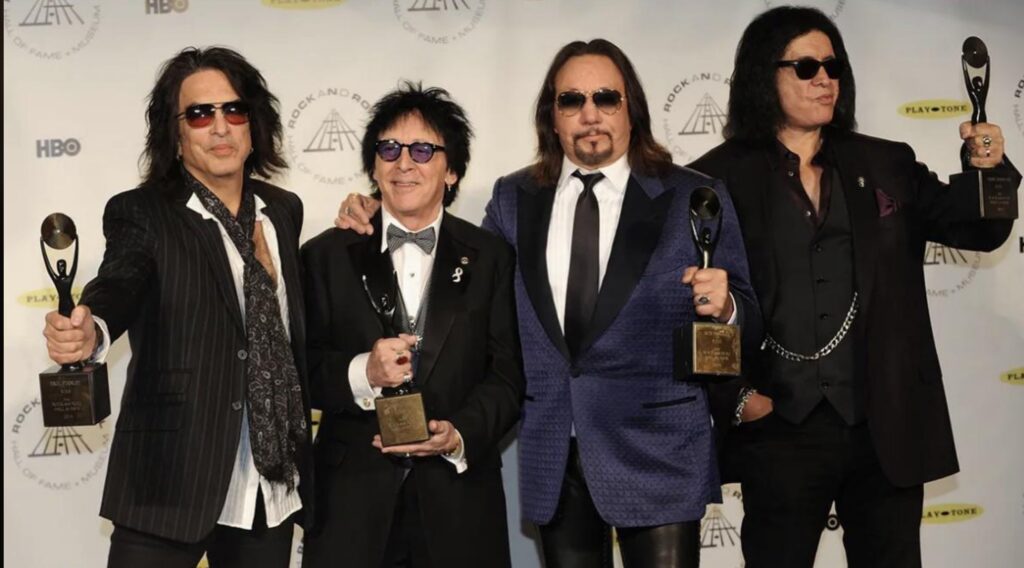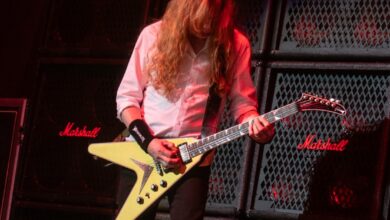The Night KISS Came Full Circle: Remembering Ace Frehley and the 2014 Rock & Roll Hall of Fame Induction

KISS’s long-awaited induction into the Rock & Roll Hall of Fame in April 2014 was more than just a trophy ceremony — it was a reckoning decades in the making. After years of being dismissed by critics despite millions of loyal fans, the four original members — Paul Stanley, Gene Simmons, Ace Frehley, and Peter Criss — finally received the honor that many believed they’d earned long ago. The setting, Brooklyn’s Barclays Center, felt poetic: four New York kids coming home as rock immortals.
Tom Morello’s induction speech set the tone. Fierce, funny, and fan-driven, it wasn’t a formal tribute — it was a celebration of defiance. Morello declared KISS “a people’s band,” a group that didn’t need critics or approval to be legendary. His words hit harder because everyone in the room knew how long KISS had fought for respect. This wasn’t a polite nod from the establishment; it was a crowd-sourced victory.
Even before the band took the stage, the air was thick with anticipation — and tension. Would they perform? Would the classic lineup finally play together one last time? When the answer turned out to be no, some groaned, others understood. But it didn’t matter; seeing the four founders standing side by side was enough to send chills through the audience.
Ace Frehley, the Spaceman, was the quiet storm of the night. Calm, reflective, and slightly amused by all the attention, he stood at the microphone with a hint of that mischievous grin that once made him the unpredictable jester of late-night TV. His remarks were brief but full of heart, acknowledging both the chaos and the camaraderie that defined their years together. For fans who grew up idolizing his silver suit and electric laugh, it was a moment of redemption.
Peter Criss, always the emotional anchor of the group, spoke softly but powerfully. He thanked the fans, the crew, and the people who believed in KISS before it became a machine. His words were warm, nostalgic, and genuine — a reminder that beneath the makeup and noise, there had always been friendship and shared struggle. He looked across the stage at his old bandmates and smiled like a man closing a very long chapter.
Paul Stanley’s speech cut through the sentiment with righteous energy. He called out the Rock Hall for taking so long to induct them, speaking directly to fans who had spent years fighting for recognition. His voice carried both pride and defiance — the same tone that had powered every arena singalong since the 1970s. It wasn’t just a thank-you speech; it was a statement of identity.
Gene Simmons followed with his usual blend of confidence and showmanship. He spoke about ambition, brotherhood, and the long road from small clubs to stadiums. For a moment, his usual fire-breathing persona gave way to sincerity. Beneath the bravado was a man remembering the friends who once dreamed alongside him — and the music that made it all real.
The night’s lineup was legendary in its own right — Nirvana, Hall & Oates, Peter Gabriel, Cat Stevens, and the E Street Band all shared the spotlight. Yet when KISS appeared, the crowd reaction was electric. You could feel decades of makeup, pyrotechnics, and rebellion surge through the air. No one cared that there wouldn’t be a live performance; the real show was simply seeing the four originals in one frame again.
For a band defined by spectacle, that night’s quiet unity became its most powerful moment. There were no guitars, no smoke, no blood — just four men who had lived through fame, fights, and forgiveness. For all their differences, the silence between them said more than any encore ever could.
Afterward, small gestures — a handshake, a laugh, a shared glance — carried enormous weight. Old wounds never truly vanish, but that night they seemed to soften. It was the briefest glimpse of peace between men who had built one of the loudest legacies in music history.
Fans left Brooklyn with mixed emotions: pride, nostalgia, sadness, and gratitude. They had witnessed something that could never be replicated. The ceremony became a time capsule, the final visual proof of KISS’s original chemistry before life and time took their toll.
Now, looking back after Ace Frehley’s death in 2025, that night carries even more meaning. It wasn’t just a Hall of Fame induction — it was the last recorded moment of all four together. Frehley’s passing at 74 marked the end of an era, but his presence in that room, smiling under the lights, remains eternal. The Spaceman had come full circle, finally at peace among the stars he sang about.
Clips from the ceremony have resurfaced everywhere since the news broke. Fans rewatch the footage not with tears alone, but with gratitude. His laugh, once wild and untamed, now sounds like a goodbye — not tragic, but triumphant. That was Ace Frehley’s gift: to make even mischief feel like magic.
In hindsight, the 2014 induction wasn’t about validation from the industry — it was vindication from history. It proved that KISS’s legacy was bigger than charts or critics. They didn’t just make music; they built a universe, one loud enough to echo forever.
And so, when fans revisit that night today, they see more than speeches or awards. They see the final frame of a story that began in the 1970s — four dreamers from New York who changed the face of rock and roll. For Ace Frehley, it was the last encore, delivered without a guitar, but with that unforgettable grin that still shines like a star burning just beyond reach.





